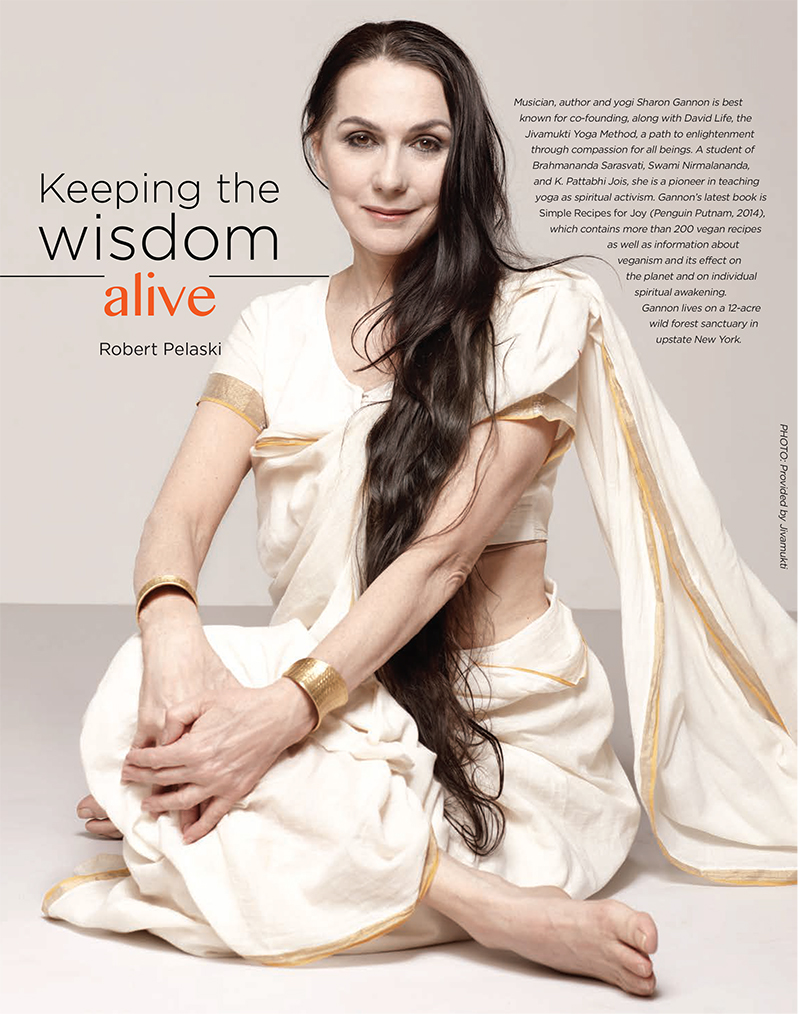 by Robert Pelaski
by Robert Pelaski
Musician, author and yogi Sharon Gannon is best known for co-founding, along with David Life, the Jivamukti Yoga Method, a path to enlightenment through compassion for all beings. A student of Brahmananda Sarasvati, Swami Nirmalananda, and K. Pattabhi Jois, she is a pioneer in teaching yoga as spiritual activism. Gannon’s latest book is Simple Recipes for Joy (Penguin Putnam, 2014), which contains more than 200 vegan recipes as well as information about veganism and its effect on the planet and on individual spiritual awakening. Gannon lives on a 12-acre wild forest sanctuary in upstate New York.
Sharon Gannon will begin her 17-city national book tour in Chicago with various events Sept. 19. On Saturday, Sept. 20, she will lead a 10 a.m. asana class, followed by a Q&A, book signing and reception from 1:30-3 p.m. at Samgha Yoga Shala, 2961 N. Lincoln Ave., Chicago. For more information or to register, visit samghayoga.com.
Who are your teachers and what have they taught you?
GANNON: I try to learn from every encounter with every person. There have been a few special persons in this life who have been incredibly kind and have patiently preserved to provide me with specific yogic teachings that have helped and guided me. These saintly beings include Randy Hall, Shri Brahmananda Sarasvati, Swami Nirmalanda, Sri K. Pattabhi Jois and Shri Shyamdas. They have taught me that there is nothing in this world that is not God—all is God appearing in many disguises.
How do you define guru, and how would someone know when or if they have discovered one?
GANNON: Guru is a Sanskrit word that directly translates as “remover of darkness” (Gu= darkness as in confusion or ignorance; Ru= that which removes, or remover).
Whatever or whomever helps to remove what is obscuring the truth is the guru. Guru is the enlightenment principle. Enlightenment is the state where ignorance and confusion are absent. Guru helps you to remember what you forgot. When there is an increase in satchitananda (truth, consciousness and bliss), you know the guru is present.
Jivamukti Yoga is quite vigorous. Can you explain its core philosophy and the process for the one-month residential teacher training?
GANNON: The practices of Jivamukti yoga are vigorous because most of us need some shaking up to help us let go of our negative habits and perception of ourselves as victims. The one- month teacher training course we offer four times a year in the U.S., Costa Rica, Germany and India is for people who either want to become Jivamukti yoga teachers or who want to immerse themselves in an intense program—a crash course in how to attain enlightenment in one month. We also offer a 800-hour apprentice/mentor program. This is available through all Jivamukti Centers for those who have graduated from the 300-hour course and want to go deeper.
What is the most misunderstood aspect of yoga today?
GANNON: I don’t think all people understand the real potency of asana practice, that asanas can lead to enlightenment by helping you to resolve karmic relationships with others.
How does spirituality play a role in yoga?
GANNON: Yoga means to join with the eternal holy spirit. The nature of God is satchitananda existence consciousness and mostly bliss. Yoga practices help us to let go and let God. They help us to experience an expansiveness leading to the realization that we are not just a body and mind, but that we are eternal spiritual beings whose true nature is joy.
How important is it to have a dedicated teacher or a teacher who is part of a lineage?
GANNON: When you have a teacher who is part of a lineage—a long line of teachers and teaching—it connects you to that long line of teachers and teachings. Yoga is about letting go of your small self and all the normal petty cravings for recognition that come with identification with ego. No one teaching yoga today made it up—yoga is an ancient tradition. A teacher who acknowledges that they are part of a lineage and has studied with a teacher tends to be humble. They feel fulfilled to be passing on the teachings—by being part of a larger picture. Humility is the greatest virtue for a teacher or a student to cultivate.
How do JY Centers worldwide and its affiliate centers keep the lineage alive?
GANNON: By providing a place for people to come and create satsang or community. Without community the teachings cannot be shared. The name of Robert’s yoga center, Samgha, means to keep and maintain the association of others who believe that awakening is possible.
What literature can you recommend for students to gain more insight about yoga?
GANNON: Patanjali’s Yoga Sutra, Hatha Yoga Pradipika, Bhakti Narada Sutra and the Bhagavad Gita. But in order to absorb the subtle mystical teaching inherent in these holy books, a student must have a teacher and a satsang to help them contemplate, immerse and gain insight into the application of the wisdom in these teachings. It is very difficult to do this alone.
What is your hope for your students, particularly since they are spread across the globe?
GANNON: Happiness.
Robert Pelaski owns Samgha Yoga Shala, 2961 N. Lincoln Ave., Chicago which specializes in Jivamukti, ashtanga and vinyasa yoga.
























No Responses to “Keeping the Wisdom Alive: Q&A with Sharon Gannon”